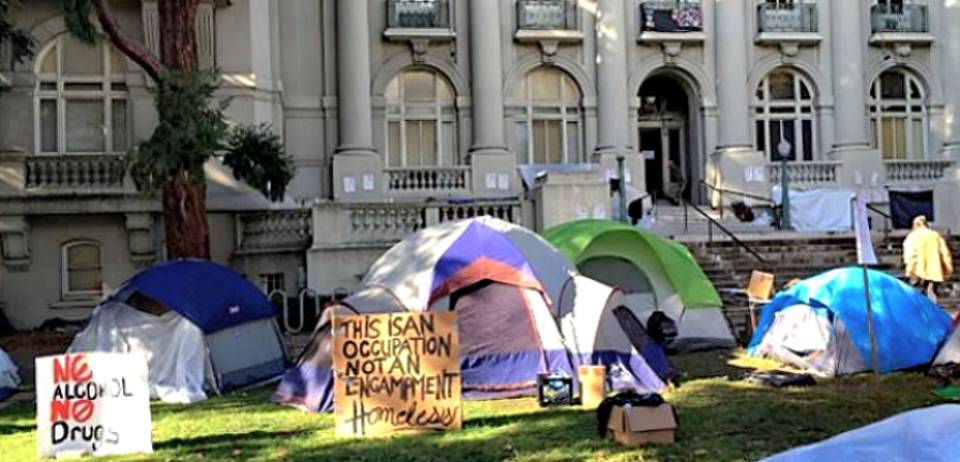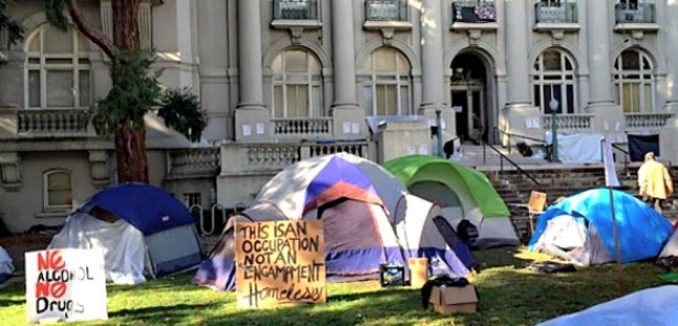

This tent city at Old City Hall, set up by First They Came for the Homeless in late 2015, was one of many demolished by the Berkeley Police Department.


This tent city at Old City Hall, set up by First They Came for the Homeless in late 2015, was one of many demolished by the Berkeley Police Department.
Jan. 25 was the first time I’d ever attended a Police Review Commission meeting in Berkeley, a California university town across the bay from San Francisco. I went with nine other community members to the North Berkeley Senior Center, to express our opposition to three terrible policies of the city government and its police department. These were:
That night we heard several homeless people testify to the brutality (and smugness) of Berkeley Police Department officers when they had repeatedly raided the neat and well-regulated tent encampments organized by First They Came for the Homeless, a direct-action and advocacy group. The police broke up the encampments and confiscated property belonging to homeless camp residents.
One notable feature of the meeting was the presence of Acting Police Chief Andrew Greenwood and three other grim-faced officers, at a special table. Any time the chief wanted to speak, he just started talking and the chair yielded to him, for as long as the chief wanted to talk. In contrast, we community members had two minutes each at the start of the meeting (under “public comment”) after which we were expected to shut up and listen.
As for the commission itself, a majority of its members supported the police on each of the three issues. I thought to myself: What if 50 or 100 community people came, took over the rigged meeting and let the people speak?
A flashback to the freedom struggle in South Africa
After the meeting, I went for a beer with a friend and described my first experience with Berkeley’s Police Review Commission. It reminded him of something from the history of the African National Congress, at a time when they were fighting to free South Africa from settler colonialism.
In the apartheid-era South Africa of 1941, there was an augustly named Transkei Territorial Authorities General Council. The ANC described it as “a government-inspired creation, which had elected members … and nominated chiefs, [and] which had very limited administrative powers in the Transkei.”
Govan Mbeki, an ANC and South African Communist Party militant, served on the Transkei Council. Mbeki himself famously likened it to “a toy telephone — you can say what you like, but your words have no effect because the wires are not connected to any exchange.” Similarly, toothless Bantustan “parliaments” set up by the settler regime were referred to contemptuously by ANC activists as “toy telephones” — giving the appearance but not the reality of participation in governance.
Nowadays, Berkeley has a proliferation of “commissions” designed to allow community input and advise the city council on various policy matters. Sometimes the commissions can play a useful role, and the people will righteously make use of them to push for needed changes. Still and all, if Govan Mbeki were around today, I bet he’d put our Police Review Commission squarely in the “toy telephone” category.
Liberal Berkeley gets a military tank
Recently, Berkeley emerged from an election with a new mayor and a new city council majority identified as “progressive.” A few days after they were installed in office, the new city council debated whether to purchase a bulletproof armored personnel carrier for the BPD, a $205,000 vehicle for which Berkeley would have to put up $80,000, with Homeland Security funding the balance.
Some 20 people spoke against the purchase, including Veterans for Peace member Daniel Borgstrom, who exclaimed: “Call it what you want, it’s an urban assault vehicle. That’s a tank. And we don’t need a tank!” VFP member Gene Bernardi wondered why the city was collaborating in a DHS-sponsored police militarization program, especially in light of the recent national election. Other residents deplored the use of military equipment against Indigenous water protectors at Standing Rock, N.D., and wondered if the new tank might be used against Black Lives Matter protesters in Berkeley.
In the end, the new city council decided that the armored vehicle was something the BPD really needed. Only one member voted against it.
As part of Workers World newspaper’s coverage marking the 50th anniversary of the liberation of…
From the PFLP Central Media Office The following statement from the Popular Front for the…
Newark, New Jersey Over 250 people, representing over 250 New Jersey endorsing community groups, attended…
Special to Workers World The following is a press release issued on April 24, 2025,…
dear Larry Krasner, we heard you sued Elon Musk over his corrupt million election giveaways…
Unions join forces against harassment and deportation of members When 200 immigrant workers – from…